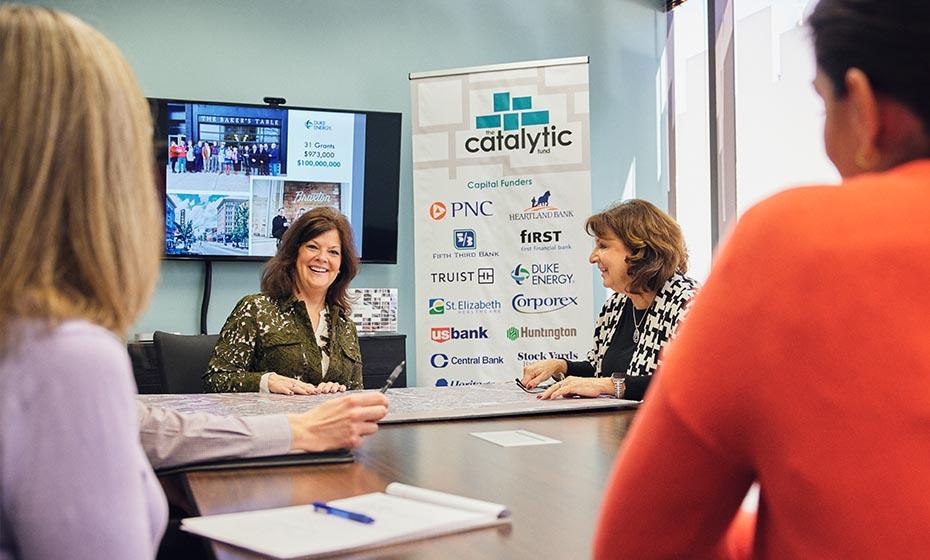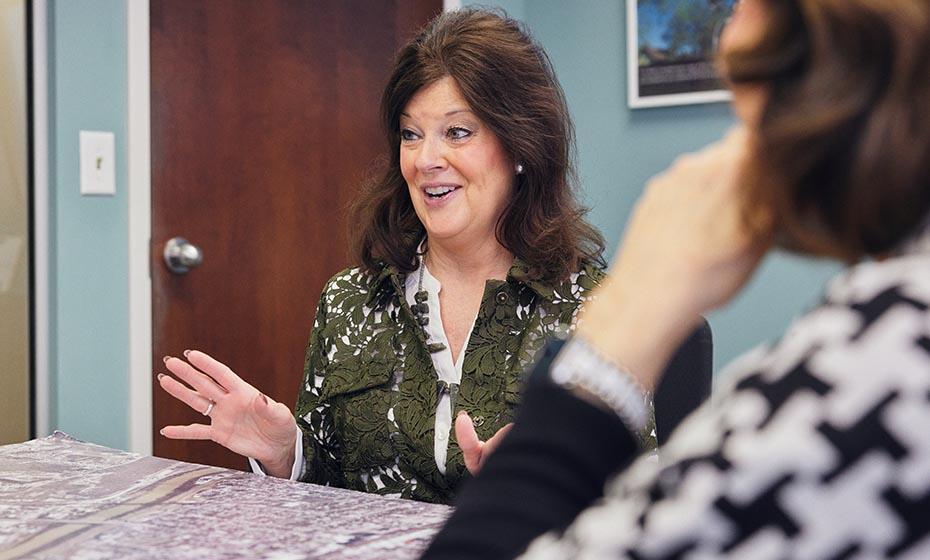Making Bold Moves Toward a Strong, Vibrant Community
For three-plus decades, Rhonda Whitaker Hurtt has inspired change in the communities she serves
Whether she’s delivering a speech to community leaders or brainstorming over a cup of coffee, Rhonda Whitaker Hurtt can capture the essence of her job in a few passionate words.
“A strong, vibrant community and economy is the backbone of success for all the businesses and families in our region,” she said. “I appreciate that our company embraces that.”
Her mission is as much a calling as it is a job. Having devoted 32 years to Duke Energy, Whitaker Hurtt has dedicated the past six to her role as vice president of community relations in Ohio and Kentucky.
In March, when we mark the contributions of women as part of Women’s History Month, her story inspires. It is built on positive energy and optimism, family tradition and a belief in the power of collaboration.
“Whether working with urban redevelopment experts, the dozens of workforce partners with whom we’ve partnered to grow our talent pipeline or the economic development teams we’ve collaborated with to expand jobs locally,” she said, “there is a treasure trove of philanthropic companies and nonprofits in our region that inspire us every day at Duke Energy to join – or lead – where we can.”
In her current Cincinnati-based position, Whitaker Hurtt is laser-focused on community outreach in northern Kentucky and southwestern Ohio. Working with local leaders in the region, she’s become the civic face of Duke Energy. There is no one better to fill that role, colleagues agree.
Brent Cooper, president & CEO of the Northern Kentucky Chamber of Commerce, has worked with Whitaker Hurtt (who chaired the chamber board in 2017-18) for 20 years.
“Best boss I ever had,” he said, citing her gift for treating everyone the same – with kindness – whether it’s a CEO or the folks in maintenance. “That always stuck with me.”
Duke Energy’s Marvin Blade, vice president of community relations in Indiana, marvels at how she gets things done by forging relationships and building trust.
Whitaker Hurtt is also quick to celebrate the successes of others, said Amy Spiller, state president of Duke Energy in Ohio and Kentucky.
“She embodies what it means to create an inclusive and welcoming environment,” Spiller said. “We’re proud and privileged to be Rhonda’s teammate.”
Much of Whitaker Hurtt’s career – 17 years – has been focused on government and community relations, but has also encompassed everything from economic development, investor relations and large account management to strategic planning and more.
It’s a perfect match, she said of working for an organization that’s long been an economic development partner in the communities it serves.
“Economic development is a team sport,” Whitaker Hurtt said, “and we are the voice of energy on these projects that require substantial investment and bring jobs and tax benefits to the community.”
She helped establish the Duke Energy Urban Revitalization Initiative, which has invested more than $3.2 million in grants to more than 100 projects in Ohio and Kentucky, funding things like architectural planning, environmental assessment, engineering services and consulting.
“These communities tell us how critical these dollars have been,” Whitaker Hurtt said. “We have seen how these cities and neighborhoods have been transformed – that’s what is exciting to us.”
This work is a natural complement to Duke Energy’s other economic development initiatives, including the Site Readiness program, which helps identify and evaluate sites in Duke Energy-served communities for potential future industrial development. To date, the program has generated more than 5,000 jobs and $2.6 billion in capital investment in Ohio and Kentucky.
Other notable achievements under Whitaker Hurtt’s watch:
When she chaired the Northern Kentucky Chamber of Commerce, Whitaker Hurtt led a regional team that is helping expand the talent pool in high-demand job sectors with the 2018 launch of GROW NKY, which aims to grow, attract and retain a globally competitive workforce.
Over a 50-year stretch, Whitaker Hurtt was the first woman to chair the Northern Kentucky United Way Campaign, a dedicated group of community leaders who want to make life and opportunities better for the region’s less fortunate citizens. The campaign raised over $4 million in 2011, a 5% increase over 2010’s results.
She has also devoted herself to the region’s most vital organizations and causes – from ArtsWave, the engine for Greater Cincinnati’s arts, to the YWCA of Greater Cincinnati, a nonprofit organization dedicated to empowering women and eliminating racism.
“Rhonda has elevated Duke Energy’s stature in our region to new heights during her tenure with the company,” said Jeanne Schroer, president & CEO of The Catalytic Fund. “She has brought millions of dollars in economic development to our region, supported dozens of community initiatives … and has made Northern Kentucky an incredible place to live and work in her service as a Catalytic Fund board member. Our region is a measurably better place thanks to Rhonda’s tireless work.”
Whitaker Hurtt understands the value of hard work. But in finding her place and moving up in a Fortune 150 company, she developed other qualities it takes to succeed.
“I learned to lean in and not hesitate to take a seat at the table, which wasn’t always easy in my early years,” she said. “But Duke Energy’s unwavering support of a diverse work culture has energized me to lift others and be the most collaborative, optimistic and impactful leader I can be.”
Those other qualities?
- Care about your community.
- Find a mentor to help guide your professional journey. Be a mentor to someone whose journey is beginning.
- Know that how you treat others – colleagues, customers, the folks sitting beside you at a meeting – means everything.
- Don’t burn bridges. Make friends for life.
- Take on a challenge even when you doubt your abilities.
- Be bold.
Whitaker Hurtt’s Duke Energy connection was forged early. The Franklin, Ohio, home she grew up in got its gas and electricity from a forerunner to Duke Energy. And her grandfather, “Pop” Hamilton, was a lineworker back in the day for Cincinnati Gas & Electric Co., now a part of Duke Energy. She proudly saved his retirement plaque.
She graduated high school as Valedictorian, then attended Miami University in Oxford, Ohio, where she earned degrees in Political Science and Public Administration – in just 3 1/2 years.
Also inspiring is how she earned those degrees. At one point, she worked two jobs to get through college. From 6 p.m. to 6 a.m. Friday and Saturday, she waited tables at a Bob Evans restaurant. Six hours after finishing her weekend shift, she’d report for work (at noon Sunday) at the Sycamore dress shop.
Five years after graduating, she began her career at Duke Energy. It is still going strong.
“My mother, my father and my grandfather,” Whitaker Hurtt said, “they would have been proud of that, right?”
Whitaker Hurtt and her husband, Dave, live in Crescent Springs, Ky. Each weekday morning, she makes the 15-minute drive to her office in downtown Cincinnati. No matter what’s on her agenda that day, the top of her to-do list never changes.
“It’s about how I can serve.”
Bringing in businesses. Boosting our communities.
Duke Energy’s Site Readiness program sparks economic growth by helping communities understand what steps to take to make their sites more competitive.
By identifying, assessing, and improving industrial sites in Duke Energy service areas, the program helps increase awareness (and the competitiveness) of potential industrial land, resulting in new jobs and tax base in Duke Energy-served communities.
The Site Readiness program is an instrumental tool for the regions we serve,” Spiller said. “It helps not only identify new sites, but helps the communities understand next steps to bring major economic development wins which result in prosperity for their residents.”
Of the 370+ sites that have been evaluated since the program began, over 144 companies have landed on those properties, generating $48 billion in capital investment and 48,600 jobs in North Carolina, South Carolina, Florida, Indiana, Ohio, and Kentucky.
View original content here.







